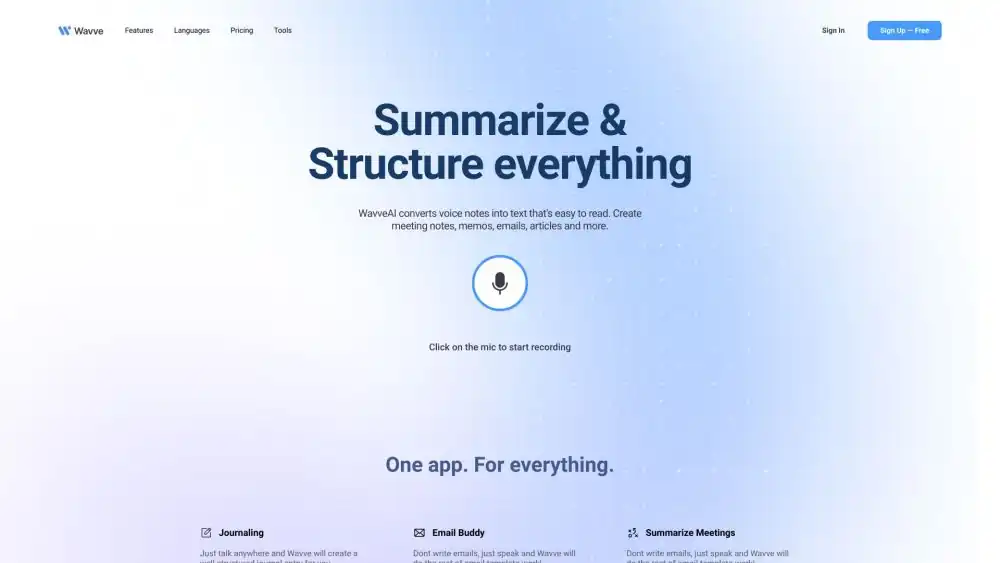Wavve AI: Harmonizing Audio with Artificial Intelligence
Wavve AI is a cutting-edge platform that leverages artificial intelligence to revolutionize audio processing and analysis. By harnessing the power of advanced algorithms, Wavve AI empowers users to extract meaningful insights from audio data, enhance audio quality, and create innovative audio experiences.
Whether it’s for music production, audio editing, or research purposes, Wavve AI offers a comprehensive suite of tools designed to streamline workflows and deliver exceptional results. From noise reduction and audio restoration to audio transcription and music generation, Wavve AI provides a versatile solution for audio professionals and enthusiasts alike.
Would you like to focus on a specific aspect of Wavve AI, such as its core features, target audience, or benefits?
Pros and Cons of Wavve AI
Pros
- Efficiency: Automates time-consuming audio tasks.
- Accuracy: Delivers precise results through AI-powered algorithms.
- Versatility: Applicable across various audio-related industries.
- Creativity: Offers tools for audio enhancement and creation.
- Time-Saving: Reduces manual effort and accelerates audio projects.
Cons
- Dependency on AI: Relies on AI algorithms, which might have limitations.
- Audio Quality: Excessive processing can potentially degrade audio quality.
- Cost: Advanced features might require premium subscriptions or pay-per-use models.
- Data Privacy: Handling audio data raises privacy concerns.
- Learning Curve: Users might need to familiarize themselves with the platform’s interface.
Would you like to focus on a specific pro or con, or perhaps compare Wavve AI to other audio processing platforms?
Wavve AI Pricing
Wavve AI typically offers a tiered pricing structure to accommodate different user needs and budgets.
Common pricing models for audio processing platforms include:
- Credit-based system: Users purchase credits to process audio files, with pricing varying based on file length, complexity, and processing time.
- Subscription-based model: Offers monthly or annual plans with different feature sets and usage limits.
- Pay-per-use: Users are charged based on actual audio processing volume.
- Custom pricing: Tailored plans for enterprise customers with specific requirements.
Factors affecting pricing:
- Audio file length and format: Longer or complex audio files might incur higher costs.
- Processing complexity: Tasks like noise reduction, transcription, or audio generation can impact pricing.
- API usage: Frequent API calls could lead to additional charges.
- Data storage: Storage of processed audio files and data might incur costs.
To get the most accurate and up-to-date pricing information, it’s recommended to visit the Wavve AI website or contact their sales team.
Would you like to explore specific pricing examples or compare Wavve AI to other audio processing platforms?
Alternative Audio Processing Platforms
Here are some popular audio processing platforms that offer similar functionalities to Wavve AI:
Online Audio Editors
- Audacity: Free, open-source audio software with basic editing tools.
- Website: https://www.audacityteam.org/
- Adobe Audition: Professional-grade audio software with advanced features.
- Hindenburg Journalist: Designed for podcasters and journalists.
- Website: https://hindenburg.com/
AI-Powered Audio Platforms
- Descript: Offers transcription, editing, and collaboration features.
- Website: https://www.descript.com/
- Otter.ai: Primarily for transcription but also offers some audio editing tools.
- Website: https://www.otter.ai/
- AssemblyAI: Focuses on speech-to-text and audio intelligence.
- Website: https://www.assemblyai.com/
Music Production Software (With Audio Editing Capabilities)
- Ableton Live: Known for music production but also offers audio editing tools.
- Website: https://www.ableton.com/
- FL Studio: Popular digital audio workstation with audio editing capabilities.
- Website: https://www.image-line.com/flstudio/
Note: These are just a few examples, and the best platform for you will depend on your specific needs and budget.
Would you like to compare these platforms based on specific features or pricing?
FAQs About Audio Processing Platforms
General FAQs
- What is an audio processing platform? An audio processing platform provides tools and features to manipulate and enhance audio files.
- What kind of audio files can be processed? Most platforms support common audio formats like MP3, WAV, and AAC.
- Do I need audio editing experience to use these platforms? Many platforms offer user-friendly interfaces and tutorials to cater to users with varying skill levels.
- How accurate are AI-powered audio processing features? Accuracy can vary depending on the complexity of the task and the quality of the AI model.
Features and Functionalities
- What are the common features of audio processing platforms? Common features include noise reduction, equalization, compression, and audio effects.
- Can these platforms convert audio to text? Some platforms offer transcription services, converting audio to text.
- Can I create music with these platforms? While not primarily designed for music production, some platforms offer basic music creation tools.
Pricing and Plans
- How are audio processing platforms priced? Pricing models include free plans, subscriptions, and pay-per-use options.
- What factors affect the pricing? Factors like the number of audio files, file size, and access to advanced features influence pricing.
- Are there free alternatives to paid platforms? Yes, there are free open-source options and online tools available.
Would you like to know more about a specific audio processing platform or feature?
Conclusion
Audio processing platforms have become essential tools for individuals and businesses involved in music production, podcasting, video editing, and other audio-related fields. By offering a range of features from basic editing to advanced AI-powered tools, these platforms empower users to enhance audio quality, extract valuable information, and create engaging audio content.
As technology continues to evolve, we can expect even more sophisticated and user-friendly audio processing platforms to emerge, further expanding the possibilities for audio creation and manipulation.
Would you like to explore specific use cases for audio processing or discuss the impact of AI on the audio industry?
![]()






